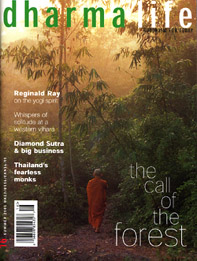Going Forth The Call of the Forest Introduction to the Theme
'What does the forest whisper?' asks Sangharakshita in his poem, 'The Call of the Forest'. The forest is the traditional abode of those who leave the world and its distractions to follow the Buddha's example of intensive meditation and solitude.
Reginald Ray is the great historian of this tradition which, he argues in Yogi spirit, has often been forgotten by institutional Buddhism. Without the challenges of the forest, he says, Buddhism becomes a husk. In Love in a wild climate, Kamala Tiyavanich shows that for Thai thudong monks the forest was no rural idyll, but a place where encounters with wild animals tested their positivity and made them face their deepest fears.
In Whispers of solitude Prakasha tells how he pioneered a new way to follow such a life in establishing a vihara in a remote valley in Spain. A co-founder of the Vihara, Padmakara reflects in Jungle bound on the inspiration that can be drawn from depictions of forest life in Shantideva's classic text, the Bodhicaryavatara. And in Smiles and shadows Kirsten Duell's account - in stories and pictures - of her travels portrays the mix of renunciation, oppression, superstition and devotion that makes up Buddhism in Burma today.
Reginald Ray argues that 'the forest' can be a metaphor for a spirit of freedom that is attainable within any lifestyle. Our 'People' feature, too, touches on this theme. Confronting times recounts how Subhadramati is discovering that spirit through challenges that have brought her to her limits, and beyond.
As Sangharakshita's poem tells us:
The whisper's a dream-whisper,
But dreams are of the Soul,
And Soul itself a forest
Beyond the mind's control.



